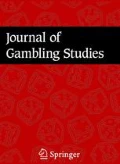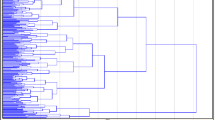Abstract
Professional gamblers are more likely than amateur gamblers to meet criteria for problem gambling but minimal research has examined their gambling behavior and its consequences. This study compared gambling behavior, problem gambling symptoms, related harms, recognition, and help-seeking among problem semi/professional gamblers (PPGs/PSPGs) and problem amateur gamblers (PAGs). Surveys completed by 57 self-identified professional gamblers, 311 semi-professional gamblers and 4226 amateur gamblers were analysed. PPGs/PSPGs were significantly more likely than PAGs to be male, younger, never married, speak a language other than English at home, and have higher psychological distress, compared to PAGs. PPGs/PSPGs were more likely to gamble more frequently on many skills-based forms, but most also participated in several chance-based forms. PPGs’/PSPGs’ most common problematic gambling form was electronic gaming machines and they were more likely to have problems with sports betting than PAGs. Most PPGs/PSPGs reported coming out behind on all gambling forms over the previous year. PPGs/PSPGs were more likely than PAGs to report chasing losses and numerous detrimental financial gambling consequences. This group’s self-identification as PPGs/PSPGs is clearly inaccurate and perhaps a means to avoid stigma, elevate status and support problem denial. PPGs/PSPGs may represent an extreme example of gamblers with erroneous cognitions and beliefs who lack the required discipline and skill to be successful professional gamblers. The findings identify a group of problem gamblers who may benefit from interventions to dispel their mistaken self-identity, and emphasize the need for more rigorous confirmation of professional gambler status in future research.
Similar content being viewed by others
References
Bjerg, O. (2010). Problem gambling in poker: Money, rationality and control in a skill-based social game. International Gambling Studies, 10(3), 239–254.
Carroll, A., Rodgers, B., Davidson, T., & Sims, S. (2013). Stigma and help-seeking for gambling problems. Canberra: ACT Gambling and Racing Commission.
Ciarrocchi, J. W. (2001). Counseling problem gamblers: A self-regulation manual for individual and family therapy. Orlando: Academic Press.
Delfabbro, P. (2004). The stubborn logic of regular gamblers: Obstacles and dilemmas in cognitive gambling research. Journal of Gambling Studies, 20(1), 1–21.
Derevensky, J., Sklar, A., Gupta, R., & Messerlian, C. (2010). An empirical study examining the impact of gambling advertisements on adolescent gambling attitudes and behaviors. International Journal of Mental Health and Addiction, 8(1), 21–34.
Ferris, J., & Wynne, H. (2001). The canadian problem gambling index: Final report. Ottawa: Canadian Centre on Substance Abuse.
Frances, A., & First, M. B. (2000). Am I okay?: A layman’s guide to the psychiatrist’s bible. New York City: Simon and Schuster.
Gainsbury, S. M. (2012). Internet gambling: Current research findings and implications. New York: Springer.
Gainsbury, S. M., Russell, A., Blaszczynski, A., & Hing, N. (2015). The interaction between gambling activities and modes of access: A comparison of Internet-only, land-based only, and mixed-mode gamblers. Addictive Behaviors, 41, 34–40.
Gainsbury, S. M., Russell, A., Hing, N., Wood, R., Lubman, D. I., & Blaszczynski, A. (2014). The prevalence and determinants of problem gambling in Australia: Assessing the impact of interactive gambling and new technologies. Psychology of Addictive Behaviors, 28(3), 769–779. doi:10.1037/a0036207.
Griffiths, M., Parke, J., Wood, R., & Rigbye, J. (2010). Online poker gambling in university students: Further findings from an online survey. International Journal of Mental Health and Addiction, 8(1), 82–89.
Hardy, T. W. (2006). A minute to learn and a lifetime to master: Implications of the poker craze for college campuses. New Directions for Student Services, 113, 33–41.
Hing, N., Gainsbury, S. M., Blaszczynski, A., Wood, R., Lubman, D. I., & Russell, A. (2014a). Interactive gambling. Melbourne: Gambling Research Australia.
Hing, N., Holdsworth, L., Tiyce, M., & Breen, H. (2014b). Stigma and problem gambling: Current knowledge and future research directions. International Gambling Studies, 14(1), 64–81. doi:10.1080/14459795.2013.841722.
Hing, N., Russell, A., Blaszczynski, A., & Gainsbury, S. M. (2014c). What’s in a name? Assessing the accuracy of self-identifying as a professional or semi-professional gambler. Journal of Gambling Studies,. doi:10.1007/s10899-014-9507-9.
Hopley, A. A., & Nicki, R. M. (2010). Predictive factors of excessive online poker playing. Cyberpsychology Behavior and Social Networking, 13(4), 379–385.
Horch, J., & Hodgins, D. (2008). Public stigma of disordered gambling: Social distance, dangerousness, and familiarity. Journal of Social and Clinical Psychology, 27(5), 505–528.
Istrate, A.-M. (2011). From pathological to professional: Gambling stories. Journal of Comparative Anthropology and Sociology, 2(2), 49–67.
Jang, H. C., Lee, B., Park, M., & Stokowski, P. A. (2000). Measuring underlying meanings of gambling from the perspective of enduring involvement. Journal of Travel Research, 38(3), 230–238.
Lee, C. K., Lee, B., Bernhard, B. J., & Lee, T. K. (2009). A comparative study of involvement and motivation among casino gamblers. Psychiatry Investigation, 6(3), 141–149.
Letarte, A., Ladouceur, R., & Mayrand, M. (1986). Primary and secondary illusory control and risk-taking in gambling (roulette). Psychological Reports, 58(1), 299–302.
MacKay, T. L., Bard, N., Bowling, M., & Hodgins, D. C. (2014). Do poker players know how good they are? Accuracy of poker skill estimation in online and offline players. Computers in Human Behavior, 31, 419–424.
Majamäki, M. H., & Pöysti, V. K. (2012). Vocabularies of gambling justification among Finnish and French players. European Journal of Cultural Studies, 15(4), 496–512.
McCormack, A., & Griffiths, M. D. (2012). What differentiates professional poker players from recreational poker players? A qualitative interview study. International Journal of Mental Health and Addiction, 10(2), 243–257.
McMullan, J.L. (2011). Submission to the joint select committee on gambling reform inquiry into interactive gambling. http://www.aph.gov.au/senate/committee/gamblingreform_ctte/interactive_online_gambling_advertising/submissions.htm. Retrieved 3 Sept 2013.
Monaghan, S., Derevensky, J., & Sklar, A. (2008). Impact of gambling advertisements and marketing on children and adolescents: Policy recommendations to minimise harm. Journal of Gambling Issues, 22, 252–274.
Productivity Commission. (1999). Australia’s gambling industries (Report No. 10). Canberra: Ausinfo.
Radburn, B., & Horsley, R. (2011). Gamblers, grinders, and mavericks: The use of membership categorisation to manage identity by professional poker players. Journal of Gambling Issues, 26, 30–50.
Raylu, N., & Oei, T. P. (2004). Role of culture in gambling and problem gambling. Clinical Psychology Review, 23(8), 1087–1114.
Rosecrance, J. (1988). Professional horse race gambling: Working without a safety net. Work and Occupations, 15(2), 220–236.
Shead, N. W., Hodgins, D. C., & Scharf, D. (2008). Differences between poker players and non-poker-playing gamblers. International Gambling Studies, 8(2), 167–178.
Taber, J. I., Russo, A. M., Adkins, B. J., & McCormick, R. A. (1986). Ego strength and achievement motivation in pathological gamblers. Journal of Gambling Behavior, 2(2), 69–80.
Tanasornnarong, N., Jackson, A., & Thomas, S. (2004). Gambling among young Thai people in Melbourne, Australia: An exploratory study. International Gambling Studies, 4(2), 189–203.
Toneatto, T. (1999). Cognitive psychopathology of problem gambling. Substance Use and Misuse, 34(11), 1593–1604.
Toneatto, T., Blitz-Miller, T., Calderwood, K., Dragonetti, R., & Tsanos, A. (1997). Cognitive distortions in heavy gambling. Journal of Gambling Studies, 13, 253–266.
Wardle, H., Moody, A., Griffiths, M., Orford, J., & Volberg, R. (2011). Defining the online gambler and patterns of behavior integration: Evidence from the British Gambling Prevalence Survey 2010. International Gambling Studies, 11(3), 339–356.
Weinstock, J., Massura, C. E., & Petry, N. M. (2013). Professional and pathological gamblers: Similarities and differences. Journal of Gambling Studies, 29(2), 205–216.
Wood, R. T., & Williams, R. J. (2007). ‘How much money do you spend on gambling?’ The comparative validity of question wordings used to assess gambling expenditure. International Journal of Social Research Methodology, 10(1), 63–77.
Acknowledgments
The study that this paper is based on was commissioned by Gambling Research Australia—a partnership between the Commonwealth, State and Territory Governments. Gambling Research Australia provided financial support for this project and approved this manuscript for publication.
Conflict of interest
The first author declares no conflict of interest in relation to this manuscript. She has received research funds from government and industry sources. The second author declares no conflict of interest in relation to this manuscript. He has received research funds from government sources. The third author declares no conflicts of interestst in relation to this manuscript. She has received research funds from government and industry sources. The fourth author declares no conflict of interest in relation to this manuscript. He has received research funds from government and industry sources.
Ethical standard
Ethical approval was obtained from two university human research ethics committees. All procedures performed in studies involving human participants were in accordance with the ethical standards of the institutional and/or national research committee and with the 1964 Helsinki declaration and its later amendments or comparable ethical standards.
Author information
Authors and Affiliations
Corresponding author
Rights and permissions
About this article
Cite this article
Hing, N., Russell, A.M.T., Gainsbury, S.M. et al. A Case of Mistaken Identity? A Comparison of Professional and Amateur Problem Gamblers. J Gambl Stud 32, 277–289 (2016). https://doi.org/10.1007/s10899-015-9531-4
Published:
Issue Date:
DOI: https://doi.org/10.1007/s10899-015-9531-4



